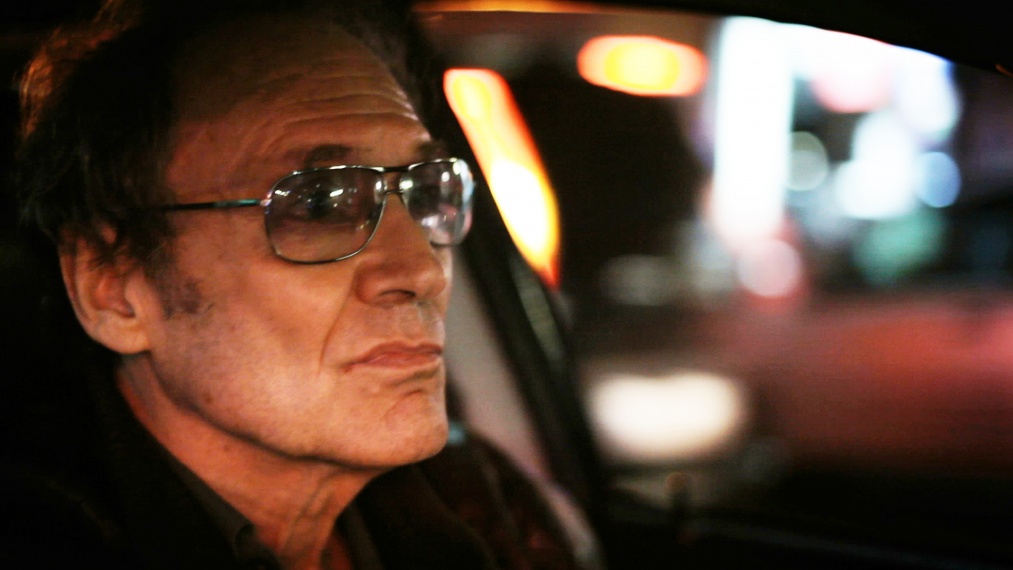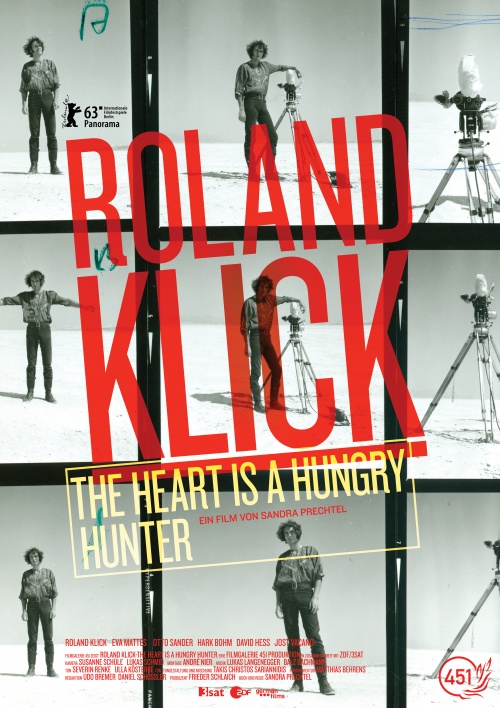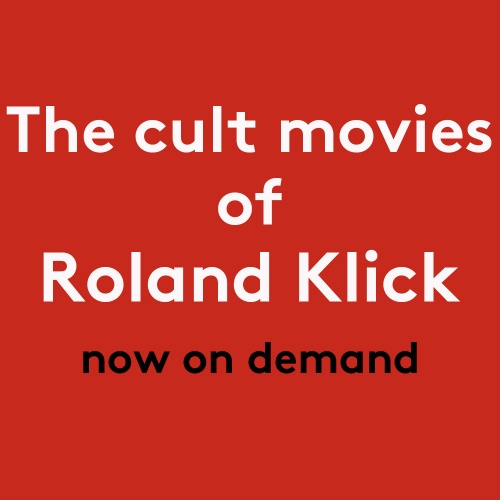
Roland Klick – The Heart is a Hungry Hunter
GER 2013, 80 min
At the age of 14 Roland Klick was certain: cinema was what his soul was longing for. Filmmaking as an adventure, existential experience and escape from overstructured German post-war reality. The film director as explorer and foreign legionnaire, in search of himself.
Synopsis
Roland Klick, the director of films such as DEADLOCK and WHITE STAR has an exceptional position in German cinema. Maladjusted to the forms of New German Cinema of the 1970s, too imaginative and unconventional for commercial cinema, Klick was marginalized by the critical establishment. Although his films won several German Film Awards, were international acclaimed and achieved cult status, Klick was written out of history. His dystopian punk-rock odysseys, acid-drenched Westerns and youth-oriented crime dramas are now ripe for rediscovery.
ROLAND KLICK - THE HEART IS A HUNGRY HUNTER by Sandra Prechtel is a documentary about one of the most extraordinary directors in the history of German film.
Streaming-Info
Rent or buy the movie on our Vimeo channel. For other providers, see “Watch Movie”.
Language: German, Subtitles: English, French, German
Press reviews
“He was a dreamer inside a German - not an easy thing to be!” recalls actor David Hess about director Roland Klick, in whose 1983 film White Star he appeared. Klick made this film, as he tells Sandra Prechtel in her documentary, in order to get over his Waterloo: widely regarded as the great white hope of German cinema at the time, Klick had recently been ousted as director of the film Wir Kinder vom Bahnhof Zoo. (...) in The Heart is a Hungry Hunter this director who defies all categories reveals himself as humorous and far from embittered. Excerpts from his films and comments from contemporaries such as Eva Mattes, Otto Sander and Hark Bohm round off this portrait of a class-conscious director, a man for whom film was not about ‘telling those up there about those down there’, but who also made his films for those who otherwise probably don’t give a hoot for cinema. (indiewire, 2013)
Klick did not make films, he made cinema.And the calling of his cinema was to be sensual, not to make sense. His galvanizing work (three short and eight features made between 1962 and 1988) is hot, not cold; it knows nothing of the New German Cinema’s distanciation and self-reflection. His signature style, in the appraisal of Rudolf Worschech (coeditor of the prominent German journal epd film), blends “exactness of observation, occasionally disjunctive editing, a disdain for the extraneous, the portrayal of characters through their actions and not their words, an emphasis on the physical and on action.” (...) Klick’s legacy should prod us to rethink German film history, finding a place for a significant cinema that coexists with and yet stood apart from the Neuer Deutscher Film. (Artforum, Mai 2013)
Awards and Festivals
- Berlinale 2013, Panorama Dokumente
- Viennale 2013
- Filmfest Hamburg 2013
Additional Texts
Sandra Prechtel on ROLAND KLICK – THE HEART IS A HUNGRY HUNTER
How did you approach Roland Klick? How does one best put his story, his philosophy and his work into a documentary film?
For me, everything started with the first images of the film SUPERMARKT. Watching that, I asked myself how it was possible that I had never heard about this director or his films before. It became clear to me that Roland Klick’s philosophy was very contrary to the Zeitgeist and should consequently be at the heart of my film. During my research, his story became more apparent; it was the story of a man who was obsessed with the arts and always lived and worked on the razor’s edge.
When did you shoot and edit the film? Which aspects of Klick and his work became the most significant for you in the process of making the film?
In January 2011, Frieder Schlaich and I decided to make this film. Frieder Schlaich of the Filmgalerie 451 released Klick’s films on VHS and DVD and made it possible for his work to be revisited and remembered. With the small financial support of 3Sat, we shot between July and September 2011. Our major question was whether the story should be arranged in a chronological, subject-oriented or more experimental way. We realised that Roland Klick’s life story has had a very classical, suspenseful narrative. In Roland’s work, there was this hopeful beginning that was followed by initial success. Then came the first struggles with DEADLOCK, the fight to continue work against all odds, followed by complete exhaustion and the final withdrawal from filmmaking. Roland’s films and his protagonists have always been mirror images of his own situation. It became clear that we would have to tell his story through his films. By that we could show what cinema means to him, what his work as a director looked like and what moral implications every frame revealed. In the editing room, we realised that you get so strongly pulled into the story that all you want to know is what happens next.
Compared with Roland Klick’s films, your documentary has a softer tone. This echoes in the way the film is shot, edited, narrated and scored. What lead you to this form?
The best compliment we’ve received about the form of the film was from Roland himself. He said he liked the way he turned out so feminine in the film. His observation is true, because you can easily see a feminine side not only in Klick but also in most of his characters, despite all the violence he portrays. The weird thing is that I am usually very sensitive to on-screen violence, but in Roland’s films I find it bearable. The violence is comitted by people whose passion and desperation and anger I can feel and understand. But what I always like best is the strange poetry in Roland’s films, like the one scene in DEADLOCK between Kid and Jessie where it’s all about mirrors and sunbeams. And then there is a melancholic side to me that is also part of Roland’s story. The music I use is inspired by Roland’s own scores like those of BÜBCHEN or SUPERMARKT. Another inspiration was Thomas Imbachs DAY IS DONE and Balz Bachmann’s score, which I loved, and which has the same ‘70’s feel to it. I knew from the very beginning that I wanted him to make the music for the film. The music is supposed to reflect Roland as a person with all the melancholy that I see in him.
Is there something in particular that you want the audience to get out of your film?
An interest in Roland Klick’s films of course. The strong feelings, the longing for strong feelings, the lust for life and love.
Credits
Director and Screenplay
Sandra Prechtel
With
Roland Klick, Eva Mattes, Otto Sander, Hark Bohm, David Hess, Jost Vacano
Director of Photography
Susanne Schüle, Lukas Schmid
Editor
André Nier
Music
Lukas Langenegger, Balz Bachmann
Sound
Takis Christos Sariannidis, Severin Renke, Ulla Kösterke
Sound Design and Mixing
Takis Christos Sariannidis
Producer
Frieder Schlaich
Produced by
Filmgalerie 451
In Collaboration with
ZDF/3sat (Udo Bremer, Daniel Schössler)
World Premiere
09.02.2013, Berlin, IFF - Panorama Dokumente
DVD-Details
Extras
Short film by Roland Klick LUDWIG (GER 1964, 16 min), Interviewfilm by Frieder Schlaich THE CINEMA OF ROLAND KLICK (GER 1997, 73 min), Outtakes, Original Theatrical Trailer
Language
German
Subtitles
English, French
Country Code
Code-free
System
PAL / Color
Length
80 min + 107 min Extras
Aspect Ratio
16:9
Sound Format
DD 2.0
Content
Softbox (Set Content: 1)
Release Date
10.07.2014
Rating
From 12 Years
Distribution Details
Screening Format
DCP (2K, 25 fps, 5.1)
Blu-ray Disc
Aspect Ratio
Digital, 16:9
Language
German
Subtitles
English
Promotion Material
A1 poster
License Area
Worldwide
Rating
From 12 Years











